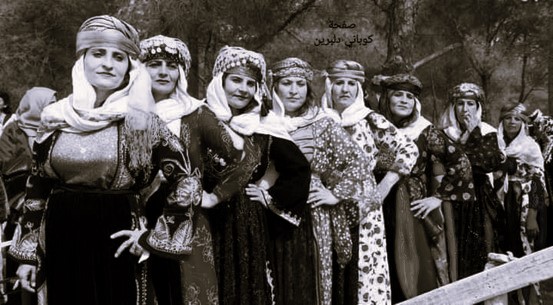In Kurdish folklore and oral literature, one can hear various stories, advisory anecdotes, beliefs, and traditions that differ from one area to the other with some elements added to them or omitted from them. Kobane, one of the cities in the West part of Kurdistan, Rojava, has a rich folklore with many traditional elements in it.
The traditions and customs are paths for the society to grow based on them and continue their lives. These traditions and customs can be seen in their daily lives, some of which still have an impact on them like clothing, wedding ceremonies, funerals, parties, etc.
Marriage Traditions
In the past, two people could not marry willfully. When a family decides their son needs to get married, the father would make this decision without even asking his son; this was a decision made by the father and the elderlies of that family who would go and talk to the girl's father. In this marriage, the two people who were supposed to get married and spend the rest of their lives together could not even meet each other. The elderlies would only talk to the girl's family. If the bride's father would agree he would say: I give her to you, without the bride's opinion on this matter or her being aware of getting married or who the groom is. From the day the groom's family would officially go to the bride's home to ask for her father's consent to the wedding day, the groom could not return to the village.
Khalkhi, Aplkhi, Delkhi and …
Before the bride left her father's house, it was necessary that her uncles agree with this marriage. The groom's family would go to the bride's mother's brother (Khal) asking: "What is your request?" They would give the bride's uncle some money to make him agree to the wedding, some would not ask for anything and would say: "Your coming here is enough." The same thing would be carried out for the bride's father's brother (Mam). However, it was a big problem if the bride's Khal (her mother's brother) would not agree because the bride would never leave her father's house. Sometimes, the bride's mother would ask for a gift, thus, they would give her some money.
Wedding
At that time, the wedding party would last for three days and three nights. The guests were invited from the surrounding villages and the groom's relatives would prepare the meals and invite the guests to their homes.
Their clothes; girls and women would put on Kurdish clothes (Kaftan dress, Barvanaka, Qadifa, Katana Malas, Sha'ra Kesarawany). The men also had special Kurdish clothes particular to that region (Kase Zangin, Karase Sitgroz).
On the last day of the wedding, the groom's father, mother, and siblings would go to the bride's home and escort her home on horseback. They would bring the bride home without their son knowing her.
When the groom would go to see his bride, the groom's mother would wait for them behind the door. The groom's mother would wait to see evidence of the bride's virginity and that she had not had any relationships with other men or married someone else before. The sign was a blood-stained piece of cloth.
Goher (to exchange bride with a bride)
It used to be a common tradition in Kobane and even nowadays it can be seen but the conditions have changed now. To exchange a bride with another bride means, a family who have given their daughter to another family as a bride would ask for a female relative of them in return. The elderlies of two villages would negotiate with a third-party village to do this and they would send their brides on horseback to that village so that they could meet one another. Nobody could talk except the elderlies. They would exchange the brides in silence and each village would take home their new brides.
This phenomenon caused many social consequences. When one of the couples would face problems in their life and they would decide to get divorced the other couple had to get divorced too even if they did not have any problems. If one of these men marries another woman in addition to his wife, the opposite couple had to go through the same process, that is, both couple's lives would ruin as a result of any such decisions even if they had children.








